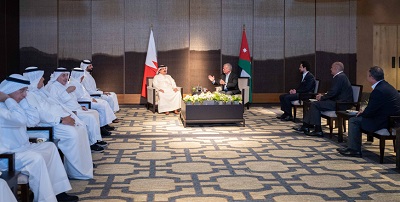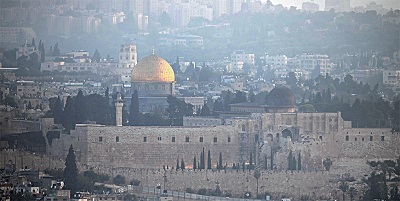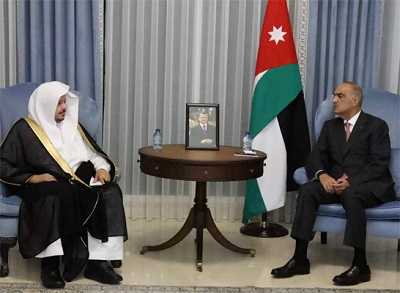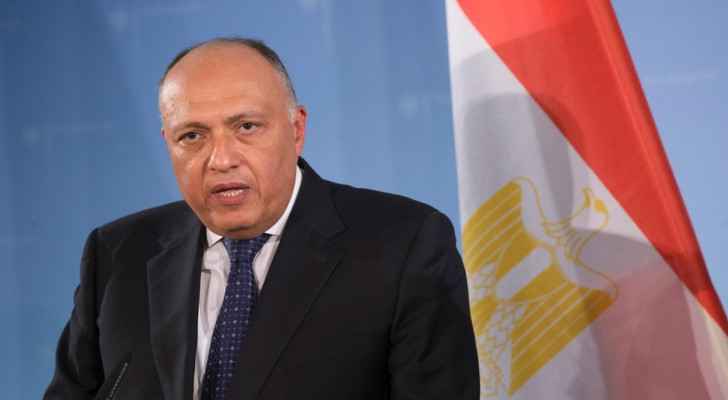Palestinians won’t show up for Jared Kushner’s Mideast conference. Israel is likely to sit it out, too.

Anne Gearan, Souad Mekhennet and Loveday Morris, Washington Post
A U.S.-backed investment conference to drum up business for Palestinians will have no Palestinian government representatives and Israeli officials appear unlikely to attend, leaving in doubt whether the session can raise significant money or political support for President Trump’s effort to strike a Middle East peace deal.
The investment and development gathering that opens Tuesday in Manama, Bahrain, includes a roster of wealthy and powerful figures from international business and finance, many with connections to Trump’s aide and son-in-law, Jared Kushner, who organized the session.
But it is short on regional business leaders, a primary audience for Kushner’s message that local economic empowerment can do more for Palestinians than what he sees as a moribund political leadership fixed on outdated ideas and unrealistic demands.
By design, the two-day Peace to Prosperity session will not consider the most difficult elements of a potential peace settlement between Israel and the Palestinians, such as borders, land claims and the future of Jerusalem.
It will hash over an optimistic set of economic proposals released Saturday that envision some $50 billion in investment, infrastructure and tourism in the Palestinian West Bank and Gaza Strip, and in the neighboring countries of Egypt, Jordan and Lebanon.
The most ambitious idea is probably a new transit corridor through Israel that would connect the two Palestinian areas, something the current right-wing Israeli political coalition would be highly unlikely to accept.
“For too long the Palestinian people have been trapped in inefficient frameworks of the past,” Kushner said in a statement released by the White House. “The Peace to Prosperity plan is a framework for a brighter, more prosperous future for the Palestinian people and the region and a vision of what is possible if there is peace.”
But the lack of Palestinian and Israeli involvement in the conference is the latest illustration of the difficulty that Kushner and the administration are having in establishing any momentum for their peace efforts, which face deep skepticism in the region and in the United States.
Munib al Masri, 85, the billionaire industrialist known for being the wealthiest Palestinian, said he immediately rejected his invitation.
“Our problem is a political one, not an economic one,” he said. “We have dignity, we have leadership, and they don’t want to go because they believe America is not an honest broker.”
Without Palestinian representation, the initiative is doomed to fail, he said.
“It’s like going to the wedding and the bride and groom aren’t there,” he said.
Trump’s draft for a settlement of the decades-long conflict is likely to remain secret until at least the fall. It is likely to recommend greater autonomy for Palestinians living in much of the Arab land occupied by Israel, but Kushner has not publicly committed to the long-standing U.S. goal of a separate, fully sovereign Palestinian state.
In the meantime, U.S. negotiators hope to give Palestinians a glimpse of what an influx of international capital and new partnerships among Israeli and Arab businesses could offer.
The proposals outline more than 175 projects, almost all of which would require buy-in from Palestinian leaders who refuse to meet with Kushner’s team. Israel has already blocked or slowed less extensive Palestinian economic projects on grounds that they put Israel’s security at risk.
Palestinian leaders dismissed the U.S. approach.
“The issue is not the fact that the Palestinians will need investments or support,” said Hanan Ashrawi, a member of the Palestine Liberation Organization’s executive committee, in an interview last week. “The issue is that we are not in charge of our own land, our own resources, our own boundaries, our own airspace, our own territorial waters, our own freedom of movement or anything.”
The Palestinian Authority, which governs with limited autonomy in the Israeli-occupied West Bank, is boycotting the Bahrain session. Hamas, the militant Palestinian faction that has full control in Gaza, was not invited.
In a meeting with the international press on Sunday, Palestinian Authority President Mahmoud Abbas said he was doubtful the U.S.-led initiative in Bahrain would produce any tangible results and said the plans offered no new ideas.
“America is reinventing the wheel again,” he said. “Why do I need America to ask the Arab countries for money? I can go and ask the Arab countries myself for such funding.”
Asked if he had read the proposal, Abbas was vague but was adamant that there was nothing new in Kushner’s plan.
Trump’s ambassador to Israel, David Friedman, told the Arab news site Al Jazeera on Saturday that the session can be a success without the Palestinian Authority.
“There will be a significant showing from the Palestinian business community, and we will work with them as best we can,” Friedman said. “I don’t know that the Palestinian Authority is the last word on how to create a better life for the Palestinians. The Palestinians themselves should have a say in that.”
Abbas has renounced all contact with Trump and his envoys because of Trump’s 2017 decision to recognize Jerusalem as the Israeli capital.
That began a series of U.S. moves to pressure Abbas, including closing the Palestinian diplomatic office in Washington and shuttering the State Department diplomatic office for Palestinians in Jerusalem. The Trump administration has also cut funding for Palestinians and attempted to sideline the U.N. agency that provides funds for schools, hospitals and other infrastructure.
Kushner’s conference is scheduled at the same time as a gathering of that agency, the United Nations Relief and Works Agency, as a deliberate counterpoint. The Trump administration has said it wants to reframe discussions about Palestinians’ future away from a construct Kushner calls charity-based.
Israeli Prime Minister Benjamin Netanyahu has promised to review the full plan when it is presented, most likely after Israel’s second round of elections this year. The plan has been repeatedly delayed, most recently because of U.S. reluctance to issue it while Netanyahu is standing for reelection.
Netanyahu said on Sunday that Israel will keep an open mind.
“We will hear the American proposal in a fair and open manner. I can’t understand how the Palestinians rejected the plan before even hearing what is in it,” Netanyahu said.
Netanyahu spoke as he toured the Jordan Valley — the part of the occupied West Bank that borders Jordan — with visiting U.S. national security adviser John Bolton.
Netanyahu has been a vocal advocate for greater diplomatic and economic ties between Israel and the Persian Gulf, which is an idea underpinning Kushner’s plan.
Israeli U.N. Ambassador Danny Danon said he encourages public discussion of how Israeli-Arab economic trade and cooperation could benefit everyone, and how in his view Palestinian leaders stand in the way.
“Tell your people exactly the fact that the Palestinian leaders are not willing to cooperate,” Danon said about Arab officials. “Tell them that we are willing to do a lot for the Palestinians and for cooperation against Iran for global security. I think the leaders should be stronger and tell the people what they actually think.”
Israeli government participation was in flux as late as last week, with neither Israeli Foreign Minister Israel Katz nor Finance Minister Moshe Kahlon publicly confirmed.
Netanyahu on Tuesday said, “Israelis will of course participate” in the conference, though it was unclear if he was referring to business representatives who are expected to attend.
Itamar Eichner, the head of the Israeli diplomatic correspondents’ association, said the confusion was “huge” in the lead up to the event. The association had been pushing the finance minister to take a press delegation before realizing that “they were so embarrassed that they didn’t even know if they were going to go.”
Conference organizers have had a lower acceptance rate than hoped from Israeli, Palestinian and other Arab business figures, interviews with those invited suggest.
A Palestinian business leader who declined an invitation said the session is insulting.
“Their attempt to create a conference about investment in Palestine is yet another attempt by the U.S. and Israel to dangle a carrot in front of the Palestinian people by promising investments, which are essentially another word for a bribe,” he said.
The business leader, who requested anonymity to share details of the session that have not been released publicly, received a second invitation after ignoring the first.
“You are receiving this email as a follow up to Secretary Steven T. Mnuchin’s invitation to the Peace to Prosperity Workshop,” conference organizers wrote. “We look forward to seeing you in Manama.”
A preliminary schedule sent to potential participants lists top executives from U.S. energy and construction firms, as well as International Monetary Fund Managing Director Christine Lagarde and investment giant Blackstone’s chief executive, Stephen Schwarzman, among the speakers.
Trump backer and confidant Thomas J. Barrack Jr. is to moderate a discussion on “fostering a culture of innovation and entrepreneurship.”
The billionaire investor and chairman of the Trump inaugural committee did not respond to requests for comment on his goals for the session or views on Middle East peace.
Kushner has termed the meeting a “workshop” rather than a pledging conference, but a primary goal is to line up international financial support and investment interest for projects in the West Bank and Gaza Strip.
Persian Gulf power brokers Saudi Arabia and the United Arab Emirates are main sponsors for the conference, but have not yet specified what they might pay to underwrite Kushner’s plans. His plans also envision European investment and business partnerships in Africa and Asia, according to people who have spoken with Kushner.
Wealthy Persian Gulf nations are sending delegations and investment representatives, but Egypt and Jordan, traditional U.S. partners in the region, waited until Saturday to announce that each will send a deputy finance minister. Jordan said it will deliver a message at the conference stressing commitment to Palestinian sovereignty.
A senior Bahraini government official who requested anonymity to freely discuss diplomatic discussions said the session should not be interpreted as Bahrain’s endorsement of Kushner’s approach.
“This is just related to business and not politics. The fact that the workshop will take place in Bahrain will not change any of our politics or stance toward the issue,” the official said. “We still support the peace plan of King Abdullah and the idea that East Jerusalem would be the capital of a Palestinian state.”
That was a reference to the 2002 Arab peace plan proposed by the late Saudi king, which outlines a path for Arab recognition of Israel but insists on the core Palestinian demands that Israel return occupied land, including East Jerusalem.
Professor Yitshak Kreiss, the director of the Sheba medical center, will be among the Israeli private sector attendees, his spokesman Steve Walz confirmed.
“He’s honored to be invited and looking forward to the summit,” said Walz. “We don’t know exactly what’s going to go on there yet.”
Bahraini, Saudi, Russian and Turkish investment figures are listed on the program, including one who played an important role in former special counsel Robert S. Mueller III’s report on Russian interference in the 2016 election.
Mueller devoted 12 pages to Kirill Dmitriev’s efforts to meet members of the Trump administration immediately following the 2016 election. Mueller’s report describes how Dmitriev worked closely with George Nader, an adviser to the royal court of the United Arab Emirates, to try to establish a back channel to Trump at a meeting with defense contractor Erik Prince at a resort at the Seychelles in January 2017. Prince was close to former Trump adviser Stephen K. Bannon and his sister was nominated by Trump to be education secretary.
Dmitriev also worked with a friend of Kushner’s, a New York hedge fund manager named Rick Gerson, to write a plan for reconciliation between the United States and Russia, which Dmitriev implied had backing from Russian President Vladimir Putin, according to the report. Shortly before Trump’s inauguration, Gerson gave the plan to Kushner, who passed it along to Bannon and Rex Tillerson, the Exxon executive who would become Trump’s first secretary of state. Dmitriev then pressed Gerson, emailing him six days after Trump took office that his “boss,” Putin, “was asking if there had been any feed back on the proposal.”
Mueller described Dmitriev as “closely connected to Putin” and wrote that Dmitriev received a text message from another person, whose name has been redacted from the report: “Putin has won,” the text read.
The White House has not put forward a full list of attendees for Kushner’s workshop. A senior European official who declined to attend said Poland, whose right-wing government is a favorite of Trump’s, may be the only European nation to send a high-level delegation.
Western European nations are pledged to a two-state solution to the conflict and oppose Trump’s Jerusalem declaration.
A senior Middle Eastern official who also requested anonymity to voice skepticism about the conference, said that during his visits to the region Kushner has not appeared “open to listen to people who had different opinions or explained to him that his approach was disregarding historical facts and emotions of Palestinians or Arabs.”
“Imagine, if we Arabs would tell the Israelis and Americans, we will organize a conference and gather 3 trillion dollars, would you guys give us back Jerusalem?” the official said. “How would they like that? “
Others said they had hoped to be invited but had not been and were unable to obtain any information about the event.
“We support the idea very much but unfortunately weren’t invited,” said David Simcha, the President of the Israel-Palestinian Chamber of Commerce. “We tried to get some information on who is going to be there but haven’t been able to.”
Latest News
 King, Bahrain monarch stress need to maintain Arab coordination
King, Bahrain monarch stress need to maintain Arab coordination Security Council to vote Thursday on Palestinian state UN membership
Security Council to vote Thursday on Palestinian state UN membership Dubai reels from floods chaos after record rains
Dubai reels from floods chaos after record rains Khasawneh, Saudi Shura Council speaker discuss bilateral ties, regional developments
Khasawneh, Saudi Shura Council speaker discuss bilateral ties, regional developments Egyptian Foreign Minister condemns potential Palestinian displacement as 'war crime'
Egyptian Foreign Minister condemns potential Palestinian displacement as 'war crime'
Most Read Articles
- King, Bahrain monarch stress need to maintain Arab coordination
- Dubai reels from floods chaos after record rains
- Security Council to vote Thursday on Palestinian state UN membership
- Khasawneh, Saudi Shura Council speaker discuss bilateral ties, regional developments
- Tesla asks shareholders to reapprove huge Musk pay deal
- Jordan will take down any projectiles threatening its people, sovereignty — Safadi
- Hizbollah says struck Israel base in retaliation for fighters' killing
- Princess Basma checks on patients receiving treatments
- Knights of Change launches nationwide blood donation campaign for Gaza
- The mystery of US interest rates - By The mystery of US interest rates, The Jordan Times